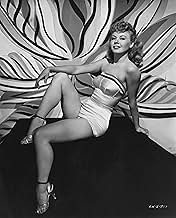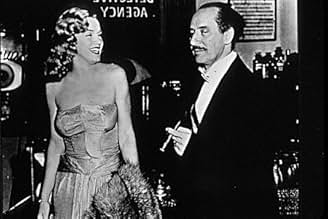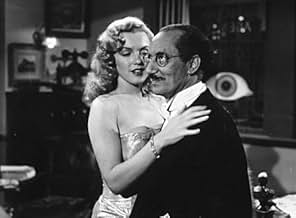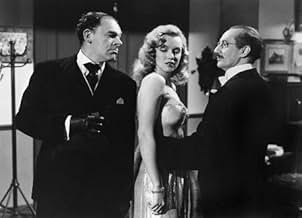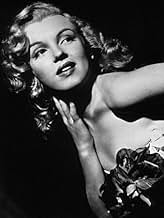IMDb RATING
5.8/10
3.2K
YOUR RATING
The Marx Brothers help young Broadway hopefuls while thwarting diamond thieves.The Marx Brothers help young Broadway hopefuls while thwarting diamond thieves.The Marx Brothers help young Broadway hopefuls while thwarting diamond thieves.
Herman Boden
- Dancer
- (uncredited)
Eddie Borden
- Man at Stage Door
- (uncredited)
Sayre Dearing
- Street Passerby
- (uncredited)
Joel Friend
- Dancer
- (uncredited)
Edward Gargan
- Cop Who Captures Harpo
- (uncredited)
Featured reviews
The Marx brothers shtik is on its last legs in this one. Some production trivia mentioned in the Turner Classic Movies airing suggest that 'Love Happy' was intended to be a Harpo vehicle, but the backers weren't going to unless Groucho and Chico were also in. A lot of the Marx vaudeville formula is evident and may seem a bit worn, but Harpo still gets me with his crazy mime and charades. He has a scene with Chico that is pretty comical. The REAL gem in 'Love Happy' is Vera-Ellen's Sadie Thompson dance number. Man, that chic could really move it on high-heels. Wow!
"Love Happy" is remembered, primarily, as the last "Official" Marx Brothers film (they would all appear in brief vignettes in "The Story of Mankind", seven years later, but not as a team), but if the film were a baseball statistic, it would have an asterik (*), because it truly isn't a showcase of the brothers, together, but a comedy starring Harpo, with Chico in a supporting role, and Groucho doing narration, and making brief appearances, occasionally (rather like the "General Electric Theater" TV episode the brothers would do, in 1959, where Harpo and Chico played crooks with hearts of gold, and Groucho would make a surprise appearance at the finale, as their lawyer).
As a comedy, "Love Happy" is so-so, with Harpo providing some genuine laughs, particularly during an interrogation scene with villains Raymond Burr, Ilona Massey, Eric Blore, and Bruce Gordon, and in the rooftop finale, with Harpo offering the same kind of outrageous physical humor that he had demonstrated in the classic MGM comedies. But the rest of the plot, while mildly entertaining, is simply a musical variation of "Room Service", as an impoverished group of performers (headed by Paul Valentine and future star Vera-Ellen) struggle to put on a Broadway musical.
The back story of the film is possibly more entertaining than the movie, itself; Harpo had wanted to make a solo film throughout the forties, and had tinkered on the script for several years, while soliciting financial backing for the project. Chico, meanwhile, was running up huge gambling debts, as was often the case (while a brilliant card player, he was a notoriously bad gambler), and just as the Marxes had made "A Night in Casablanca", in 1946, to pay off his debts at that time, Harpo brought him into "Love Happy" to do the same. Unfortunately, the end of the decade was a depressed time for film making (with television making inroads into the ticket-buying public), and backers would only fund the project if all three brothers would appear in the movie.
Groucho, by now a genuine TV star, thanks to the "You Bet Your Life" quiz show, hated the script of "Love Happy", and had little desire to co-star in the film. He was, however, loyal to his brothers, and finally reached a compromise; he would only appear briefly, would not have to wear his trademark greasepaint eyebrows and mustache, and would have final approval of his dialog and the performers working with him. He could honestly say he helped 'discover' Marilyn Monroe, at an open audition (watching two other starlets walk across a stage, followed by Marilyn, when asked for his pick for a small role, he raised his eyebrows and quipped, "You're kidding, right?")
Be warned: While "Love Happy" is not terrible, it certainly is no "Night at the Opera", or "Duck Soup"!
As a comedy, "Love Happy" is so-so, with Harpo providing some genuine laughs, particularly during an interrogation scene with villains Raymond Burr, Ilona Massey, Eric Blore, and Bruce Gordon, and in the rooftop finale, with Harpo offering the same kind of outrageous physical humor that he had demonstrated in the classic MGM comedies. But the rest of the plot, while mildly entertaining, is simply a musical variation of "Room Service", as an impoverished group of performers (headed by Paul Valentine and future star Vera-Ellen) struggle to put on a Broadway musical.
The back story of the film is possibly more entertaining than the movie, itself; Harpo had wanted to make a solo film throughout the forties, and had tinkered on the script for several years, while soliciting financial backing for the project. Chico, meanwhile, was running up huge gambling debts, as was often the case (while a brilliant card player, he was a notoriously bad gambler), and just as the Marxes had made "A Night in Casablanca", in 1946, to pay off his debts at that time, Harpo brought him into "Love Happy" to do the same. Unfortunately, the end of the decade was a depressed time for film making (with television making inroads into the ticket-buying public), and backers would only fund the project if all three brothers would appear in the movie.
Groucho, by now a genuine TV star, thanks to the "You Bet Your Life" quiz show, hated the script of "Love Happy", and had little desire to co-star in the film. He was, however, loyal to his brothers, and finally reached a compromise; he would only appear briefly, would not have to wear his trademark greasepaint eyebrows and mustache, and would have final approval of his dialog and the performers working with him. He could honestly say he helped 'discover' Marilyn Monroe, at an open audition (watching two other starlets walk across a stage, followed by Marilyn, when asked for his pick for a small role, he raised his eyebrows and quipped, "You're kidding, right?")
Be warned: While "Love Happy" is not terrible, it certainly is no "Night at the Opera", or "Duck Soup"!
I disagree with the put downs of this film by some viewers, for a very simple reason: I enjoyed watching it and found it funny. Sure, the plot is a little weak, but who watches Marx Brothers films for the plot? Actually, the plot is stronger than in many of their movies.
Groucho's role is certainly weak, but this may be Harpo's finest film, which showcases his beautiful comic style. Chico does fine, too. And they both deliver some wonderful musical performances.
The scene near the end on the rooftop amid the Times Square advertising signs is delightful. There seems to be an obvious element of "product placement," though I don't know whether the filmmakers got paid for this, but that all adds to the peculiar humor of the scene.
It's been a very long time since I first saw the classic Marx Brothers films, at least as an adult who could appreciate them. Back then they were funny. But I can't say they crack me up these days, as the gags have gotten old.
So it was wonderful to find this Marx Brothers film I hadn't seen, and to laugh at them again. This is a funny film. Period.
It is a bit sad knowing this was their last film, also knowing the great young comedy writers who were about to get started in live television, including Mel Brooks and Woody Allen. If only their talent could have been turned to writing more scripts for the Marx Brothers. Instead, they wrote for Sid Caesar's television shows, which in some ways were the heirs to the Marx Brothers humor.
I think I will watch Love Happy again, soon. I want to watch Harpo's performance more closely. It seems to me he was the last of the silent film comedians, in the tradition of Chaplin and Buster Keaton, whose humor was all in their body language. And this was his last great work.
Groucho's role is certainly weak, but this may be Harpo's finest film, which showcases his beautiful comic style. Chico does fine, too. And they both deliver some wonderful musical performances.
The scene near the end on the rooftop amid the Times Square advertising signs is delightful. There seems to be an obvious element of "product placement," though I don't know whether the filmmakers got paid for this, but that all adds to the peculiar humor of the scene.
It's been a very long time since I first saw the classic Marx Brothers films, at least as an adult who could appreciate them. Back then they were funny. But I can't say they crack me up these days, as the gags have gotten old.
So it was wonderful to find this Marx Brothers film I hadn't seen, and to laugh at them again. This is a funny film. Period.
It is a bit sad knowing this was their last film, also knowing the great young comedy writers who were about to get started in live television, including Mel Brooks and Woody Allen. If only their talent could have been turned to writing more scripts for the Marx Brothers. Instead, they wrote for Sid Caesar's television shows, which in some ways were the heirs to the Marx Brothers humor.
I think I will watch Love Happy again, soon. I want to watch Harpo's performance more closely. It seems to me he was the last of the silent film comedians, in the tradition of Chaplin and Buster Keaton, whose humor was all in their body language. And this was his last great work.
Yes, this movie is sad; it's the end of an era. Bye bye, Marx Brothers; over half a century later, you still haven't been topped.
However, this movie is not sad in the sense of being pathetic. There's still some laughs here, and on balance, I think this is better than some of the previous Marx efforts ("A Night in Casablanca" and "At the Circus" in particular). Harpo is quite charming (who's not a Harpo fan?), and I remember finding the Central Park scene quite touching. The rooftop chase is a blast, too. Granted, those two scenes are standouts and the rest of the movie is weaker in comparison, but I never found it painfully weak.
Let's put it this way; even mediocre Marx is still okay by me.
However, this movie is not sad in the sense of being pathetic. There's still some laughs here, and on balance, I think this is better than some of the previous Marx efforts ("A Night in Casablanca" and "At the Circus" in particular). Harpo is quite charming (who's not a Harpo fan?), and I remember finding the Central Park scene quite touching. The rooftop chase is a blast, too. Granted, those two scenes are standouts and the rest of the movie is weaker in comparison, but I never found it painfully weak.
Let's put it this way; even mediocre Marx is still okay by me.
Love Happy is the final movie that features the three Marx brothers (Groucho Chico Harpo) in top billing and as the stars. Once again they do the occasional musical performances. This time Frank Tashlin co-writes the script (bringing, I'd imagine, some pure cartoonish brilliance to it, in fits and starts). And it's OK... ish. Actually Harpo is better than OK, but when isn't he? This isn't even his premier work and he's delightful to watch in scenes that should be rote like when the actress asks Harpo to be his manager and he mimes becoming a "big shot" with his feet up on a can of rubbish in a park, miming as well being on the phone with many agents. It's what he was made for as a performer, moments like this.
The main problem for me is a major lack of the brothers interacting with one another - Groucho barely appears in the first half for Pete's sake, and only through limited 4th wall breaks - yet there are a lot of legitimately entertaining musical numbers (really, there isn't a dull one, including a number where a woman sings about being frustrated with motherhood). There's once again another loony but half-baked crime plot, here involving stolen diamonds in a can of... sardines I think, Chico on piano, and a musical that is on thin ice as far as being produced. Objectively this isn't as good a movie as I'm rating it, but I'm being generous because when these guys do click in their scenes they are just that funny. In other words it's better than Room Service (oddly enough this has the storyline that it's closest to), but not by much.
It's also uncanny seeing Groucho without his grease-paint mustache as a movie character with the brothers.
The main problem for me is a major lack of the brothers interacting with one another - Groucho barely appears in the first half for Pete's sake, and only through limited 4th wall breaks - yet there are a lot of legitimately entertaining musical numbers (really, there isn't a dull one, including a number where a woman sings about being frustrated with motherhood). There's once again another loony but half-baked crime plot, here involving stolen diamonds in a can of... sardines I think, Chico on piano, and a musical that is on thin ice as far as being produced. Objectively this isn't as good a movie as I'm rating it, but I'm being generous because when these guys do click in their scenes they are just that funny. In other words it's better than Room Service (oddly enough this has the storyline that it's closest to), but not by much.
It's also uncanny seeing Groucho without his grease-paint mustache as a movie character with the brothers.
Did you know
- TriviaGroucho Marx told an anecdote - both on a '60s Today Show segment and in print - that the movie's producer asked three aspiring actresses to walk seductively past Marx. Whomever Marx decided was the best walker would play opposite him in the film. When the third girl walked past, Marx asked the producer, "How could you possibly choose anyone but that last one?" Marx had chosen Marilyn Monroe for the film.
- GoofsThe theatre's name changes from the Windsor to the Century and then back to the Windsor.
- Quotes
Detective Sam Grunion, narrator of the story: I am the same Sam Grunion who solved the international uranium-mining swindle. Scotland Yard was baffled; the FBI was baffled. They sent for me and the case was solved immediately: I confessed.
- Alternate versionsThe DVD version released in 2004 runs 91 minutes (despite what it says on the box) and contains several scenes not included in the 85 min. version long seen in the U.S.- 1.Harpo giving link sausages to the front man in a bull costume by threading them through a nostril in the bull head and handing the back end man a ham. 2. Groucho showing photos of himself in different disguises with Madame Egilichi and then providing voice-over narration for a scene of Chico trying to bribe Mr. Lyons by setting him up with a chorus girl. 3. Harpo being put through a washing machine by Madame Egilichi's henchmen. 4. Harpo becoming completely enveloped in smoke from the KOOL sign and ducking into an air vent which sucks away the smoke. This version is also missing a scene in which Groucho observes that the show would have been saved if Maggie had accepted the sardines Harpo gave her.
- ConnectionsFeatured in The Legend of Marilyn Monroe (1965)
- SoundtracksLove Happy
(1949)
by Ann Ronell
Sung during the opening credits by Marion Hutton (uncredited) with chorus and danced by Vera-Ellen (uncredited)
Dance reprise by Paul Valentine (uncredited)
- How long is Love Happy?Powered by Alexa
Details
- Runtime1 hour 25 minutes
- Color
- Aspect ratio
- 1.37 : 1
Contribute to this page
Suggest an edit or add missing content



